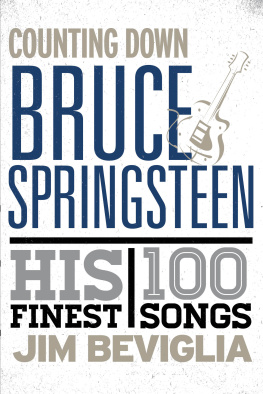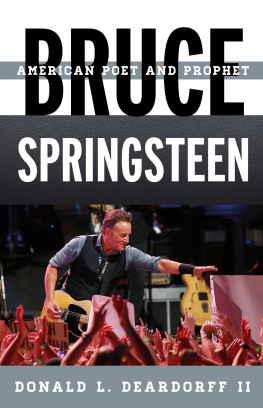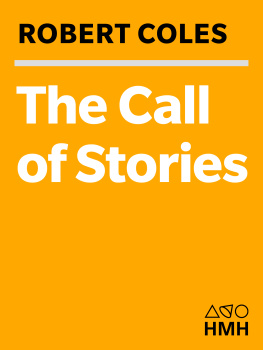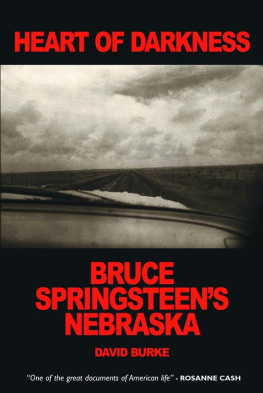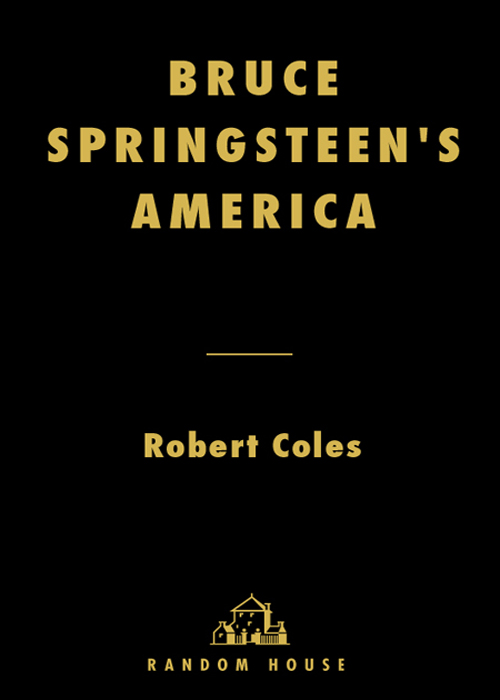
Bruce Springsteens America
THE PEOPLE LISTENING,
A POET SINGING
Robert Coles

RANDOM HOUSE NEW YORK
CONTENTS
| A Schoolteacher, The E Street Shuffle, and Nebraska |
| Saint in the City: A Lawyer |
| My Drivin Life: A Truck Driver and Blinded by the Light |
| Darkness on the Edge of Town: A Schoolteacher and Race |
| Factory: Prove It All Night |
| A Policeman Takes on the 41 Shots of American Skin, Johnny 99 |
| Born in the U.S.A.: A Businessman Crisscrossing the Country |
| Glory Days and Tunnel of Love: Thinking of My Husband, a Businessman, Traveling |
| My Hometown: A Student of Mine Whistling Bruce Between Classes |
| If I Should Fall Behind: A Grandmother and Her Family |
To the memory of Jane; to our sons, Bob, Dan, and Mike; to our grandsons Robert and William and their mother, Rene; to our grandsons Sean and Finn, and to their mother, Juliana.
To my colleagues at DoubleTake magazine, and to the memory of three writing friends and teachers (three Souls of the Departed, as Bruce Springsteen puts it) who got the idea of the magazine going: Erik H. Erikson, Walker Percy, and William Carlos Williams.
Bruce Springsteens America
I.
Conversations and Songs About Life
THE ORIGINS OF THE IDEA FOR THIS BOOK, AND OF THE decision to do the work that made this writing possible, go back to the late 1940s and early 1950s, when I was a college student studying the writing and working life of a New Jersey physician and poet, William Carlos Williams, who lived in Rutherford and ventured sometimes to Paterson and other cities of the Garden State. An enormous privilege and a continuing education it was to sit in his car and hear him speak of the patients he was treating for a wide variety of illnesses and complaints. Back at his home, at 9 Ridge Road, the doctor was not loath to take on various principalities and powers, whether of the university world or of his home state and, beyond it, the American nation, which he both loved ardently and regarded closely, critically. Id often sit surprised, perplexed, or uneasy as I heard outpourings of dismay or disgust follow expressions of his admiration and affection, directed at individuals or causes or points of view of which I knew very little, or nothing. I was learning so very much through the eyes of a busy physician who made house calls and who scribbled notes afterward about what hed heard, seenand, I was being prompted to do as he did: attend the individuals I was meeting as a medical student, then a hospital physician, in such a way that I learned how their lives were unfolding as well as how their medical difficulties might be figured out, then challenged. All that I took pains to get down for myselfnot only through hastily written notes but with a tape recorder, at the time not so easy to use as the present-day ones, which are so much smaller, lighter, and more accurate in what they capture for ones future attention.
One day in October 1954, as I sat with Dr. Williams in his office, hearing him talk about one of his patients, a teenager who had been struggling with polio and now had pneumonia, I was suddenly asked, Have you listened to Frank Sinatra do his singing? The question seemed to me to come out of nowhere, and I was initially so preoccupied with trying to understand why I had been so queried that I had no answer at all. Dr. Williams was a fluent, discerning conversationalist, and a sharply knowing observer of those with whom he spokeand so, within a few seconds, I heard this: Youre flummoxed [he loved using that word]; youre wondering what that singer, Sinatra, has to do with what we were just talking abouta kid who cant walk without crutches, and now is coughing badly, so she has her parents even more scared than they usually are.
I sat there silent, still not sure what to say. I wanted to nod a signal of agreement (if not of confession, in response to an implied criticism). Immediately, he added this amplification: Look, whether were young, or were all grown up and just starting out, or were older and getting so old theres not much time left, were human beingswere looking for company, and were looking for understanding: someone who reminds us that were not alone, and someone who wonders out loud about things that happen in this life, the way we do when were walking or sitting or driving, and thinking things over. A pause, and then a further, and more extended foray into our humanity, its various forums of expression: I mentioned this guy, Sinatra, because hes very much present in the homes, in the lives, of my patients. Hes a New Jersey boy, theyll tell me (as if I dont know!) and now hes gone national, one dad told me, contemplating the pictures of Frankie-boy all over his daughters room. Yeah, yeah, I said to myself, as I got ready to use my stethoscope and then my [neurological] hammer to check out her reflexes. But afterwards, doing my thinking as I often do, while driving home, I kept hearing Sinatra singin my head and, in a way, through that girls head. Her name was Sally Ann, and she called herself, over and over, a Sinatra fan. I pretended ignorance, hearing her talk like that (an old trick of the medical trade: let the patient do the talking, and you do the listening, the learning)and the less I seemed to know, the more I ended up finding out about Frank Sinatra, naturally, but also about this fan of his, who was also my patient.
I came home and told Flossie [his wife] about that (Sinatra and my patient), and I learned even more. Bill, she told me, with a little of the surprised teacher in her, hes so popular with young people; hes their hero, and you should listen to him, hear with your ears what their hearts are taking in. She gave me that kind but stern look, always successful in getting my head to shift gears! Next came the words, four or five of them (Im always adding them up, when I can): Hes from New Jersey. All right, I told her, this New Jersey boy will tune in on that one, Sinatralike so many of my patients have been doing. I didnt mention, then, to Flossie that a lot of my patients had already told me that Sinatra was a Jersey boyI wanted her to have the pleasure every teacher has, of being there first with a student, and besides, I think I knew in my gut that hearing Flossie say what she did would get my head going real good! A good singer does thatgets our minds going: makes us look at life with an intensity that comes from her or his head, heart, taking hold of our own.
Those words (that way of seeing things, of listening to people, and indeed, listening to those whom others regard so closely, through attending what they say and sing), would stay with me over the years. A few years later, I was myself getting to know families in their homes, or children in their schools, where they were daily learning their letters and numbers. I was teaching in college classrooms and in elementary and high schools across Boston, then the United States. That research (doing documentary fieldwork) has been written up, as has my work with teachers of my own: Erik H. Erikson, in whose college course I was privileged to teach; Dr. Williams, whose writing, whose strongly felt thoughts and beliefs, I keep offering in my class; and another American physician and writer, Walker Percy, whose eyes were often focused on the shifting social and cultural scene in the United States, whose ears took in so many of the sounds that come our way through the radio, the movies, and television, and whose reflecting mind was constantly trying to make sense of those messages, he often called them, that come our way, sometimes calling upon our attentive notice, sometimes slipping us by altogether.
Next page

